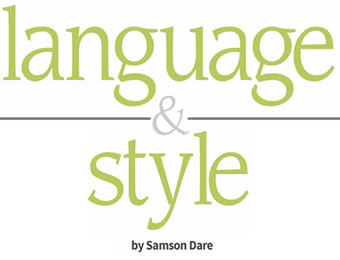SAMPLE 1: “After the letter was published, Oyegun refrained from responding to Tinubu. But he later visited President Buhari in Aso Rock and photographs of the duo laughing and sharing banters was made public…It was learnt that some Yoruba leaders had volunteered to broker a truce between Tinubu and Mimiko as the echoes of their disagreement during the countdown to Mimiko’s re-election is still fresh.”(Tinubu Makes Peace with Former Political Foes, The Punch, October 9, 2016)
Let’s pay attention to the verb-form, was, which occurs in the following structure: “photographs of the due laughing and sharing banters was made public.” That the verb-form (was) is in its singular form is an elementary and obvious grammatical fact. What may not be so obvious is the noun or noun phrase that the verb-slot is supposed to be in agreement with, requiring it to be in the singular form that it is presently. Concord is as much a matter of grammar as it is of logic. The reporter’s choice of the singular form of the verb (was) fails the test of both logic and grammar.
The only noun which has any relevance to the verb-slot and which should guide the writer in the inflection of the verb is photographs. It is more than obvious that that noun is in its plural form. And that is why it is a surprise that the reporter has offered a singular verb-form. At any rate, in view of the plural form of the relevant noun (photographs), the verb should be changed to its plural form: were.
Another verb whose form deserves attention in this same excerpt is is which occurs in the following structure: “as the echoes of their disagreement during the countdown to Mimiko’s re-election is still fresh.” It is clear, I suppose, that the verb in question (is) is in its singular form. Our next task is to identify the relevant noun or noun phrase that the verb slot is supposed to be in concord with. In doing this, we have to be sensitive, as we noted earlier, to both the grammar and the logic of the structural context.
What could have motivated the reporter’s choice of the singular verb-form (is)? What noun does he respond to? In all probability, he has been guided or rather misguided by the noun re-election, a singular noun to the immediate left of the verb-slot. This is a failure of both logic and grammar on the part of the reporter. Guided by our knowledge of both grammar and logic, we should have no problem identifying echoes as the noun that should influence the form of the verb. Since that noun is in its plural form, it should attract a plural verb-form. At any rate, the verb should be changed to its plural form: are.
Sample 2: “John a Local Council Development Area(LCDA) staff in Lagos said residents in both Moshe and Totowu village now live in palpable fear due to the constant attacks from the gang of militants.”(Militants Kidnap Naval Offer, Two Others in Lagos, The Nation, Sunday, June 19, 2016)
We are interested in the expression, a…staff, which occurs in the following context: “John a…staff in Lagos…”.As a collective noun, the wordstaff can be treated as a singular or plural item.
Please read the following sentences: 1) Thestaff is the single most important force in any establishment. 2) The staff were drawn from various companies in the metropolis. 3) Our staff is an even mix of both male and female workers. 4) All staff are expected to submit their files before the end of the day. 5) All members of staff are trained from time to time. 6) The company has a highly skilled staff. 7) The staff strength has increased by ten. 8) Half of the staff were laid off.
Can the noun be pluralized by the addition of s? Yes and no. Yes, if we are thinking of staffs of different establishments, but no if we are thinking of the staffof a single establishment. The following sentences, for example, are deficient: 1) The school’s *staffs are committed to their duties. 2) The company’s *staffs are loyal to the chairman. 3) All the *staffs in this unit are to come for the one-week workshop. 4) The chairman would like to address all *staffs of the company tomorrow. 5) The workshop is meant for all the *staffs of this school. 6) The *staffs in our Department have not received their salaries.
It is grammatically improper to have the word staff in a form carrying a final s as it does in each of those sentences.
However, when the reference is to the workers in several establishments, then it is proper to add –s to staff. Now consider the following sentences: 1) There is a forum where all the staffs of the various companies in the conglomerate meet. 2) Should the staffs of the companies belonging to the government and those belonging to private entrepreneurs be placed under the same salary scheme? 3) Representatives of staffs from private and public companies are meeting next month. 4) This consulting firm trains staffs of both government and private companies. 5) The staffs of the companies in the rubber industry will be interacting very soon.
The word staffs in each of those sentences refers to bodies or groups of workers in two or more establishments.
The word can also be used in the verb form. Let’s consider the following sentences: 1) The Department is staffed by highly intelligent and experienced people. 2) It is a well-staffed school, with about seven mathematics teachers and ten chemistry teachers. 3) The major problem of that firm is that of staffing. 4) The unit is staffed exclusively by medical doctors. 5) Of course the kitchen should be staffed by trained caterers. 6) Do you think hospitals are staffed by only doctors and nurses?
Like staff, the word personnel is a collective noun. We have said repeatedly that a single person cannot and should not be referred to as a personnel. As a collective noun, the word personnel can neither be pluralized nor modified with the word a or one. Usage examples: 1) The memo is meant for the attention of all technical personnel. 2) The vehicles are to convey only medical personnel. 3) The organization has a tradition of training and re-training its personnel. 4) All qualified personnel are to register in the Personnel Department. 5) Only senior personnel are entitled to annual leave with pay. 6) Military personnel are kept in a separate section of the estate.
Please note that the noun personnel cannot become plural by the addition of a final –s.
WATCH TOP VIDEOS FROM NIGERIAN TRIBUNE TV
- Let’s Talk About SELF-AWARENESS
- Is Your Confidence Mistaken for Pride? Let’s talk about it
- Is Etiquette About Perfection…Or Just Not Being Rude?
- Top Psychologist Reveal 3 Signs You’re Struggling With Imposter Syndrome
- Do You Pick Up Work-Related Calls at Midnight or Never? Let’s Talk About Boundaries






